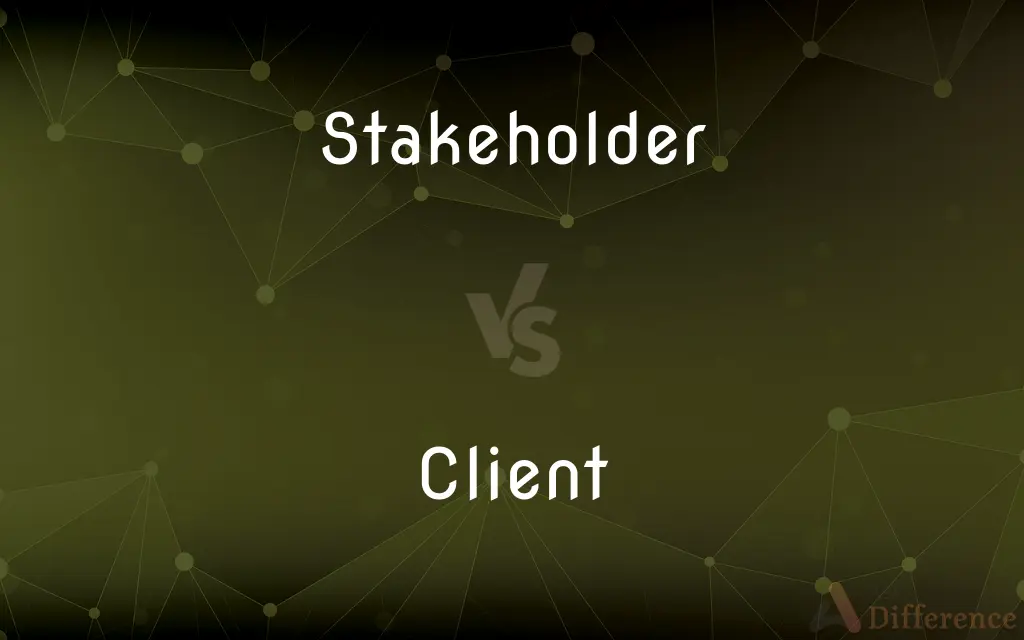Stakeholder vs. Client — What's the Difference?
By Fiza Rafique & Urooj Arif — Updated on April 6, 2024
A stakeholder is anyone with an interest in a business, including clients, employees, and investors, while a client specifically refers to someone who purchases goods or services from a business.

Difference Between Stakeholder and Client
Table of Contents
ADVERTISEMENT
Key Differences
A stakeholder encompasses a broad range of individuals or groups who have a vested interest in the operations and outcomes of a business. This includes clients, employees, shareholders, suppliers, and the community among others. On the other hand, a client is a subset of stakeholders, specifically referring to individuals or entities that engage in a direct transactional relationship with a business by purchasing its goods or services.
Stakeholders have varying levels of influence and interest in a business, depending on their relationship to it. For example, shareholders are primarily interested in profitability and long-term growth, whereas clients are more concerned with the quality and value of the products or services they purchase. This distinction highlights the multifaceted nature of business relationships and the diverse interests that must be managed within a business context.
While clients directly contribute to a company's revenue through purchases, other stakeholders such as employees and suppliers play critical roles in the production and delivery of goods and services. This demonstrates that stakeholders contribute to the success of a business in numerous ways, not just through financial transactions.
The relationship between a business and its stakeholders is typically governed by broader considerations than the more transactional relationship between a business and its clients. Stakeholders may be affected by a company's operations and decisions in a variety of ways, which necessitates a strategic approach to stakeholder engagement and management.
Understanding the needs and expectations of both stakeholders and clients is crucial for a business's success. While satisfying clients with high-quality products and services is directly related to revenue, maintaining positive relationships with other stakeholders is essential for long-term sustainability and growth. This underscores the importance of a holistic approach to business strategy that considers the needs of all stakeholders.
ADVERTISEMENT
Comparison Chart
Definition
Any individual or group with an interest in a business's operations and outcomes.
An individual or entity that purchases goods or services from a business.
Relationship
Broad, encompassing various interests and levels of influence.
Transactional, focused on the exchange of goods or services for payment.
Examples
Employees, investors, suppliers, community members.
Individuals, companies, or organizations directly buying products or services.
Main Concern
Varied, including profitability, sustainability, and ethical practices.
Quality, value, and satisfaction with purchased goods or services.
Contribution to Business
Influence through various forms of engagement and impact on business practices.
Direct financial contribution through purchases.
Compare with Definitions
Stakeholder
An individual or group with an interest in a company's success.
Employees are stakeholders who contribute to and are invested in the company's growth.
Client
Patients receiving care in a medical facility.
In healthcare, patients are regarded as clients who require attentive service.
Stakeholder
Investors who own shares of a company.
As major stakeholders, institutional investors have a say in corporate decisions.
Client
An individual purchasing professional services.
Law firms often provide personalized services to their clients.
Stakeholder
Suppliers who provide essential materials.
Suppliers are critical stakeholders in a manufacturing firm's supply chain.
Client
Online shoppers on e-commerce platforms.
Online platforms strive to increase their client base with user-friendly interfaces.
Stakeholder
Government bodies regulating business practices.
Government agencies are stakeholders in businesses due to regulatory interests.
Client
A company engaging another business for services.
The advertising agency has several major corporate clients.
Stakeholder
Community members affected by company operations.
Local communities become stakeholders when a company's operations impact their environment.
Client
Consumers buying products from a store.
Clients returning products expect quick and efficient customer service.
Stakeholder
One who has a share or an interest, as in an enterprise.
Client
A person or organization using the services of a lawyer or other professional person or company
Insurance tailor-made to a client's specific requirements
Stakeholder
One who holds the bets in a game or contest.
Client
(in a network) a desktop computer or workstation that is capable of obtaining information and applications from a server
Workstation clients are going to be easy to install
Stakeholder
A person holding the stakes of bettors, with the responsibility of delivering the pot to the winner of the bet.
Client
(in ancient Rome) a plebeian under the protection of a patrician.
Stakeholder
An escrow agent or custodian.
Client
The party for which professional services are rendered, as by an attorney.
Stakeholder
(legal) A person filing an interpleader action, such as a garnishee or trustee, who acknowledges possession of property that is owed to one or more of several other claimants.
Client
A customer or patron
Clients of the hotel.
Stakeholder
(business) A person or organisation with a legitimate interest in a given situation, action or enterprise.
Client
A person using the services of a social services agency.
Stakeholder
The holder of a stake; one with whom the bets are deposited when a wager is laid.
Client
One that depends on the protection of another.
Stakeholder
Someone entrusted to hold the stakes for two or more persons betting against one another; must deliver the stakes to the winner
Client
A client state.
Client
(Computers) A computer or program that can download files for manipulation, run applications, or request application-based services from a file server.
Client
A customer, a buyer or receiver of goods or services.
Client
(computing) The role of a computer application or system that requests and/or consumes the services provided by another having the role of server.
Client
A person who receives help or services from a professional such as a lawyer or accountant.
Client
(legal) A person who employs or retains an attorney to represent him or her in any legal matter, or one who merely divulges confidential matters to an attorney while pursuing professional assistance without subsequently retaining the attorney.
Client
A citizen who put himself under the protection of a man of distinction and influence, who was called his patron.
Client
A dependent; one under the protection of another.
I do think they are your friends and clients,And fearful to disturb you.
Client
One who consults a legal adviser, or submits his cause to his management.
Client
A person who seeks the advice of a lawyer
Client
Someone who pays for goods or services
Client
(computer science) any computer that is hooked up to a computer network
Common Curiosities
Can a client be a stakeholder?
Yes, clients are a specific type of stakeholder with a direct financial relationship with the business.
How do businesses identify their stakeholders?
Through analysis of those who affect or are affected by the business’s operations, decisions, and policies.
How do clients influence a business?
Through their purchasing decisions, feedback, and loyalty, clients directly impact a business's revenue and market position.
Who is considered a stakeholder in a business?
Anyone with an interest or stake in a business, including employees, investors, suppliers, and the community.
Why is client feedback important?
It provides insights into client satisfaction and areas for improvement, guiding product development and customer service enhancements.
Why is stakeholder management important?
It ensures that the interests and needs of all parties influencing or affected by a business are considered, promoting long-term success.
What role do stakeholders play in corporate governance?
They influence decisions and policies through formal and informal channels, contributing to the company’s direction and accountability.
What is a secondary stakeholder?
Parties not directly involved in transactions with a business but affected by its actions, like local communities.
How does a client differ from a customer?
"Client" often implies a longer-term, professional relationship, while "customer" is used for one-time or short-term transactions.
What strategies do businesses use to manage stakeholders?
Strategies include communication, engagement, addressing concerns, and aligning business practices with stakeholder needs.
How do stakeholder interests conflict?
Conflicts arise when the goals, needs, or expectations of different stakeholders are incompatible.
What is a primary stakeholder?
Individuals or groups directly involved in the operations and economic transactions of a business, such as clients and employees.
What is client satisfaction?
A measure of how products or services supplied by a business meet or surpass a client's expectations.
What are the benefits of maintaining good client relationships?
Benefits include increased loyalty, repeat business, referrals, and a competitive edge in the market.
Can stakeholders affect a company's reputation?
Yes, stakeholders can influence public perception and reputation positively or negatively through their actions and feedback.
Share Your Discovery

Previous Comparison
Elevate vs. Humiliate
Next Comparison
Passive vs. SubmissiveAuthor Spotlight
Written by
Fiza RafiqueFiza Rafique is a skilled content writer at AskDifference.com, where she meticulously refines and enhances written pieces. Drawing from her vast editorial expertise, Fiza ensures clarity, accuracy, and precision in every article. Passionate about language, she continually seeks to elevate the quality of content for readers worldwide.
Co-written by
Urooj ArifUrooj is a skilled content writer at Ask Difference, known for her exceptional ability to simplify complex topics into engaging and informative content. With a passion for research and a flair for clear, concise writing, she consistently delivers articles that resonate with our diverse audience.













































